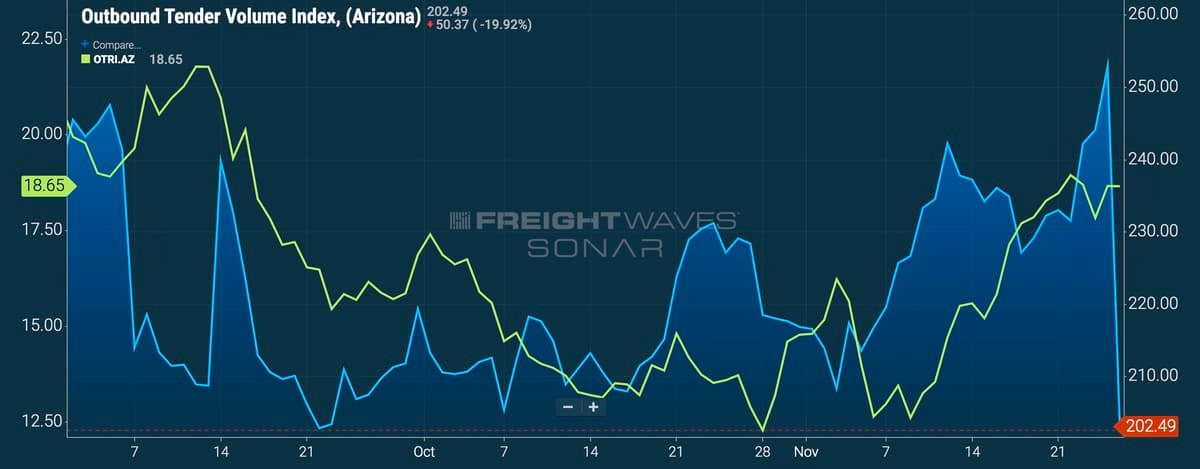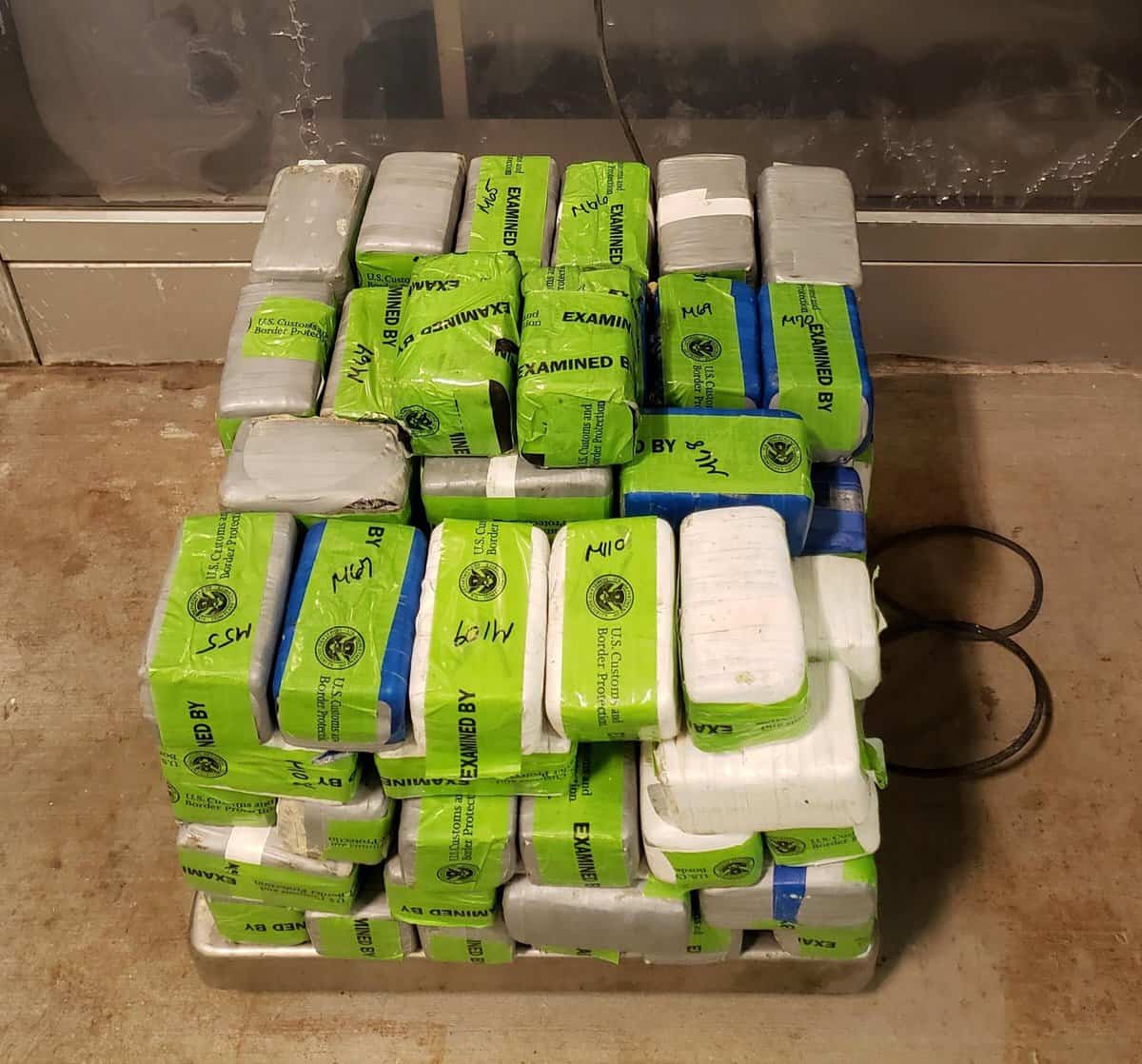Borderlands is a weekly rundown of developments in the world of United States-Mexico cross-border trucking and trade. This week: Arizona-Mexico border trade recovering slowly; Averitt Express expands in Laredo; Port of Brownsville FTZ ranks No. 2; and CBP nabs $3M in narcotics at Pharr International Bridge.
Arizona-Mexico border trade recovering slowly
Cross-border trade between Mexico and Arizona continued to gradually improve in September.
Total trade registered a 14% year-over-year decline in September, an improvement after a 22% YoY fall in August, according to data from the U.S. Census Bureau.
In April, May and June, total trade between Mexico and Arizona was down 49%, 43%, and 19% YoY, respectively.
Joshua Rubin, vice president of Nogales, Mexico-based Javid, said it’s been a tough year because of COVID-19, but he’s seen a slight uptick in recent trade activity.
Javid is a shelter company that facilitates foreign companies setting up manufacturing plants in Nogales.
“We saw an increase in trucks crossing the border in September. That could be tied either to the back orders at maquiladoras and companies trying to get back on track,” Rubin said. “I think October might have slowed down a little again, but November is definitely another one of those months that we’re expecting it to be another peak.”
The Mexican state of Sonora is home to a massive manufacturing industry, with about 105 manufacturing factories — or maquiladoras — in Nogales, just south of the U.S.-Mexico border from its sister city of Nogales, Arizona.
In September, 20,072 crossed the U.S.-Mexico border at the Nogales crossing, a 17% increase compared to September 2019.
In August, 18,891 commercial trucks crossed the border through Nogales, a 9% increase compared to 2019.
According to FreightWaves’ SONAR platform, outbound tender volumes at the border crossing in Nogales, Arizona, (OTVI.AZ) climbed for most of November before falling Thursday during the Thanksgiving holiday. Outbound tender rejections have fallen slightly since last week, putting downward pressure on rates.

The types of goods currently crossing the border range from cars, auto parts, aerospace products, medical supplies to textiles, Rubin said.
“It’s really a lot of products across the board right now,” Rubin said.
Along with Nogales, other nearby border crossings have also seen a recent spike in commercial truck activity.
“We are seeing peaks surprisingly in border towns that we never even thought we’d see peaks in — San Luis Río Colorado, Yuma. Those border towns experienced a huge increase in trucks,” Rubin said.
The San Luis Port of Entry, which connects San Luis, Arizona, to San Luis Río Colorado, Sonora, Mexico, reported 2,922 commercial truck crossings in September, a 15% increase compared to 2019.
The number of empty tractor-trailers crossing through the San Luis Port of Entry jumped 106% to 1,230 in September, compared to 596 last year.
When the Mexican government declared COVID-19 a health emergency in March, about 66% of the 45,000 maquila workers in Nogales, Mexico, were sent home, Rubin said.
“The first wave of COVID-19 was very worrisome because it shut down everything,” Rubin said. “No one could hardly work, everyone stayed home and the government forced the companies to pay employees for 30 days. It was tough on the industry.”
Over the past month, a second wave of COVID-19 cases has been increasing across communities along both sides of the U.S.-Mexico border in Texas, New Mexico and Arizona.
“What we’re seeing is definitely an increase in cases here in Sonora. We have about 41,000 confirmed cases, 28,000 are recuperating, with 3,000 deaths,” Rubin said.
Rubin said the maquiladora industry is better prepared for the second wave of COVID-19.
“Since March, the manufacturing industry started implementing the proper protocols to make sure employees were safe,” Rubin said. “Now, 100% of companies are buying masks for their employees, we have proper distancing, even plastic barriers between workers when needed. The [Mexican] government realized that the companies were taking care of the employees better at work than a lot of the employees would take care of themselves on their own at home.”
Averitt Express distribution center expands in Laredo
Averitt Express recently completed the expansion of its facility in Laredo, Texas, with the addition of 35,000 square feet of distribution and fulfillment space.
The expansion increases the company’s ability to provide a wider array of supply chain services to customers that move freight from Laredo and Mexico, officials said.
“We are excited to be able to provide our customers that ship to and from Mexico with greater capabilities that will help them streamline their cross-border supply chain,” said Wayne Spain, Averitt’s president and chief operating officer.
The addition of the enclosed distribution and fulfillment center brings the total size of the facility to 62,500 square feet and 48 truck doors.
Averitt’s expansion in Laredo follows recent openings and expansions of facilities in Atlanta, Houston and Kernersville, North Carolina.
Port of Brownsville FTZ ranks No. 2 for exports
Foreign Trade Zone No. 62 (FTZ) at the Port of Brownsville remains near the top in the nation for the value of exports, according to the U.S. Foreign-Trade Zones (FTZ) Board’s annual report.
FTZ No. 62 ranks second in the country with more than $4.3 billion in exported goods in 2019, an increase from the $3.8 billion in 2018.
“This year we’ve made significant investments in infrastructure and FTZ 62’s continuous high ranking only further validates our efforts to increase the port’s role in the global marketplace,” Eduardo A. Campirano, director and CEO of the Port of Brownsville, said in a release.
The Port of Brownsville is a deepwater seaport located along the United States-Mexico border in Brownsville, Texas. The port is a major trade channel between the U.S. and Mexico.
CBP nabs $2.9M in narcotics in carrot shipment
U.S. Customs and Border Protection (CBP) officers recently seized methamphetamine and heroin in a commercial shipment of fresh carrots arriving from Mexico.
The incident occurred Tuesday when CBP searched a tractor-trailer at the Pharr-Reynosa International Bridge in South Texas. Officers found 113 packages of alleged methamphetamine weighing 111 pounds and 31 packages of alleged heroin that weighed nearly 34 pounds.
The heroin is valued at $765,000 and the methamphetamine at $2.2 million, investigators said.

CBP seized the narcotics along with the tractor-trailer and turned the case over to Homeland Security Investigations.
Click for more FreightWaves articles by Noi Mahoney.
More articles by Noi Mahoney
Walmart’s Mexican unit under investigation for antitrust practices











